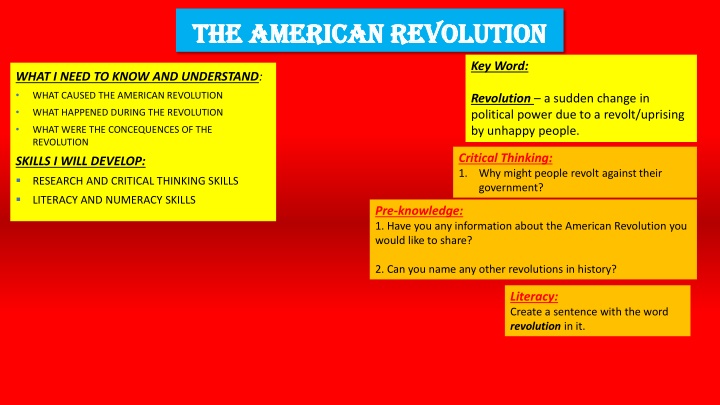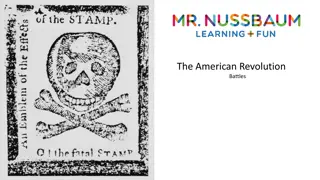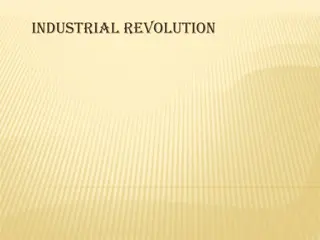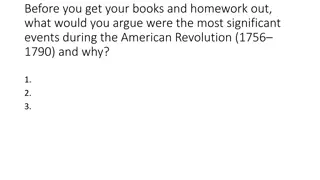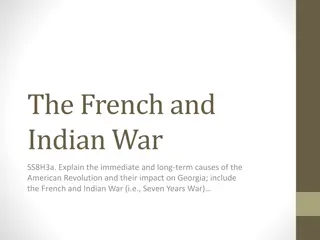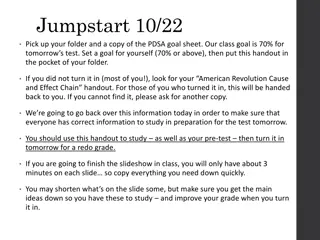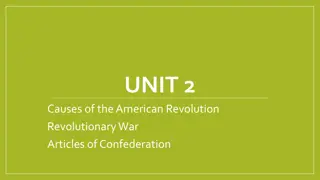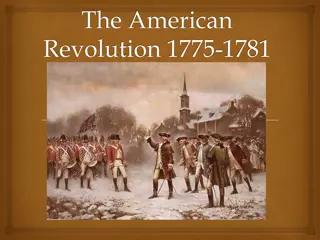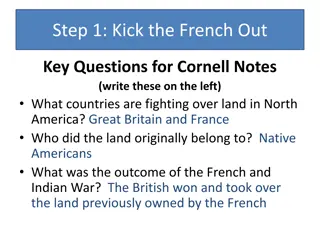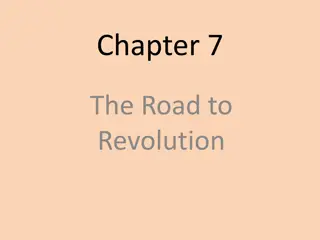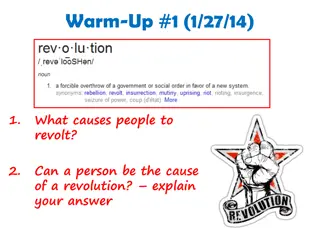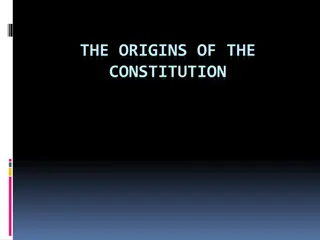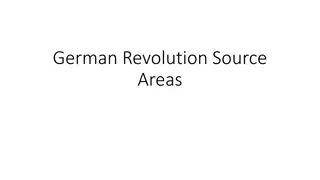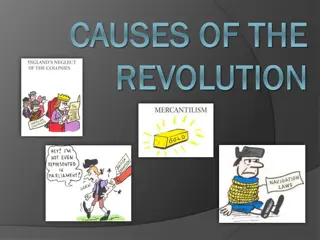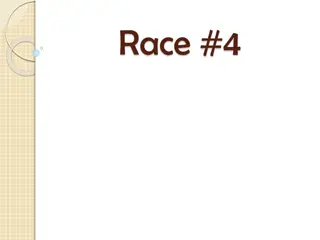The American Revolution: Causes, Events, and Consequences
The American Revolution was sparked by British government control over the colonies and imposition of taxes without representation. Key events such as the Boston Massacre and Boston Tea Party further fueled the revolt. The war ended in victory for America and led to the birth of a new nation. Explore the roots, timeline, and impacts of this historic revolution.
Download Presentation

Please find below an Image/Link to download the presentation.
The content on the website is provided AS IS for your information and personal use only. It may not be sold, licensed, or shared on other websites without obtaining consent from the author.If you encounter any issues during the download, it is possible that the publisher has removed the file from their server.
You are allowed to download the files provided on this website for personal or commercial use, subject to the condition that they are used lawfully. All files are the property of their respective owners.
The content on the website is provided AS IS for your information and personal use only. It may not be sold, licensed, or shared on other websites without obtaining consent from the author.
E N D
Presentation Transcript
The American Revolution The American Revolution Key Word: WHAT I NEED TO KNOW AND UNDERSTAND: WHAT CAUSED THE AMERICAN REVOLUTION WHAT HAPPENED DURING THE REVOLUTION WHAT WERE THE CONCEQUENCES OF THE REVOLUTION Revolution a sudden change in political power due to a revolt/uprising by unhappy people. Critical Thinking: 1. Why might people revolt against their government? SKILLS I WILL DEVELOP: RESEARCH AND CRITICAL THINKING SKILLS LITERACY AND NUMERACY SKILLS Pre-knowledge: 1. Have you any information about the American Revolution you would like to share? 2. Can you name any other revolutions in history? Literacy: Create a sentence with the word revolution in it.
Numeracy: Calculate how many years passed from Columbus discovery in 1492 until the Jamestown settlement. Context Background: A British explorer Sir Walter Raleigh began attempts to colonise North America, the 1st permanent British colony was established at Jamestown, Virginia in 1607. Opening Questions: 1. From our previous study, can you name the European man who discovered the American continent? 2. Can you name the European countries that colonised South America? 3. What European country do you suspect colonised North America? Why might this be? 13 British Colonies in North America by 1750 Activity: List-making 1. Identify & list the colonies with a female name in the title. 2. Identity & list colonies with the word New in the title. 3. Identify & list the remaining colonies by the following words within the title: Connect Mass Aware Pen Close your copy and together with a peer recall the 13 colonies of America in 1750. Britain Watch this fun clip about the 13 colonies to reinforce your learning: https://www.youtube.com/watch?v=vd0fMpAIs1s
CAUSES of the revolution The British government in London controlled the 13 colonies in America. The British government decided to introduce taxes on the colonies to pay for the war. The people living in the colonies did not go to London to discuss the taxes, nobody represented them in the British parliament. Critical thinking: What areas of life in America might they have controlled? Key Event: In 1756, Britain went to war with France over territory in North America and Canada. It was known as the Seven Years War. Britain was victorious. This war was very expensive for Britain. Why might this control cause upset for the people living in America? (L.O.1.1) Literacy: Narrative Engagement Read about the different taxes Britain introduced to the colonies in your textbook. Numeracy: What year did the war end if it lasted 7 years? Critical thinking: How might Britain have planned to pay for this war? People in the colonies protesting against the taxes - their slogan was No Taxation without Representation Literacy Task: Explain in one sentence why the colonists were protesting? What is tax? A tax is money people pay to their government, which the government use to run the country.
CAUSES of the revolution Key Event: The Boston Massacre On the evening of March 5 1770, crowds of day laborers, apprentices, and merchant sailors began to pelt British soldiers with snowballs and rocks. A shot rang out, and then several soldiers fired their weapons. When it was over, five civilians lay dead. Key Event:The Boston Tea Party On December 16, 1773, at Griffin's Wharf in Boston, Massachusetts. American colonists frustrated and angry at Britain for imposing taxation without representation, dumped 342 chests of tea, imported by the British East India Company into the harbour. Key Event: The First Continental Congress meets in Sept. 1774. Representatives from the colonies coming together to oppose the British. This group acts like a government during the war. Critical thinking: How might the British Government have responded to this act of defiance? The British introduced the Intolerable Acts, one stipulation of this Act was that all colonists had to house British troops. This angered them further. Critical thinking: Why might this event have contributed to the outbreak of Revolution in 1775? Numeracy Task: Create a timeline of the causes of the revolution from 1756-1174.
The Course of the War The Course of the War Where is all began! The Redcoats were advancing to the town of Concord to seize weapons from the militia. Key Words Militia A Volunteer Army was set up to fight against the Redcoats (British) Minutemen These were men to fight for the volunteer army with a minute s notice. Paul Revere rode through the night to alert the militia that The British are coming ! At 5am April 19th shots were fired in Lexington, 7 minutemen are dead. The Redcoats advance to Concord, over 400 militia had gathered and from a high they shoot at the Redcoats, forcing them to retreat all the way back to Boston, where a militia of over 20,000 men begin to form and will join the Continental Army.
The Course of the War The Course of the War Key Event: Common Sense On January 9, 1776, writer Thomas Paine publishes his pamphlet Common Sense, setting forth his arguments in favour of American independence. Within three months, it sold 100,000 copies. Paine attacked the idea of a monarchy and helped colonists to cement their plans to separate from the British. Literacy Research Task: Read about the war at this historical website and answer the questions: https://kids.britannica.com/kids/article/American-Revolution/353711 1. 2. 3. 4. Who did the Congress put in charge of the army in 1775? What side won the Battle of Bunker Hill in June 1775? How did this help the colonists side? Why was the Declaration of Independence signed on July 4th 1776 an important event? What city did the Redcoats force the Continental army out of in Summer 1776? What river did Washington cross with 2,400 soldiers? What subsequent victories kept the struggle for independence alive? Why was the battles of Saratoga a turning point in the war? Why might the Continental army have emerged a stronger army after spending a winter in Valley Forge, with no battles? 10. Where did the Continental army trap General Cornwallis in 1781? 11. What date did Cornwallis surrender? 12. Where and when was the peace treaty signed and what did it recognise? 5. 6. 7. 8. 9. Critical thinking: Discuss the advantages and disadvantages of the Continental army and of the British army.
3. The American revolution influenced other countries to fight for greater independence and liberty, the French overthrew their King and established a republic in the French Revolution. In1798 Ireland, attempted to gain greater liberty from Britain, but the attempt failed. 4. The Revolution influenced modern society by encouraging constitutional and democratic governments as opposed to monarchies/empires etc. 1. The USA was established as an independent country; they created their own constitution and bill of Rights. The Impact of the Revolution Critical thinking: Discuss with a partner how the American Revolution might have affected the colonies and the wider world? Key Words: Constitution a list of fundamental principles and laws of a particular state Democracy a system of government where all eligible people vote for government representatives Research: Identify the 2nd Amendment in the Bill of Rights. This is a current right of Americans. What is your opinion on this right? 5. Settlers moved Westwards in the USA, establishing new territories and State governments. 2. George Washington became the 1st American president. Literacy task: Write a paragraph explaining these impacts and why they were important for the U.S. and the world. 6. The Revolution opened new markets and new trade relationships. They created new domestic (home) markets in the West. They created their own manufacturers and became a wealthy country. Reflection: Thumbs up if you understand the causes, course and impact of the American Revolution
